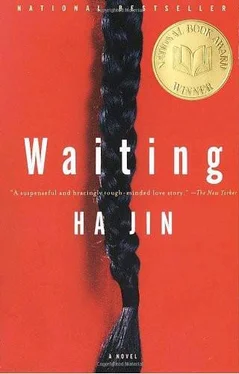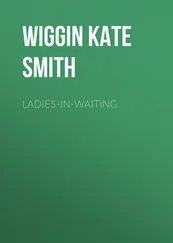FOR LISHA
ALONE AND TOGETHER
Every summer Lin Kong returned to Goose Village to divorce his wife, Shuyu. Together they had appeared at the courthouse in Wujia Town many times, but she had always changed her mind at the last moment when the judge asked if she would accept a divorce. Year after year, they went to Wujia Town and came back with the same marriage license issued to them by the county's registry office twenty years before.
This summer Lin Kong returned with a new letter of recommendation for divorce, which had been provided for him by the army hospital in Muji City, where he served as a doctor. Once more he planned to take his wife to the courthouse and end their marriage. Before he left for home, he had promised Manna Wu, his girlfriend at the hospital, that this time he would try his best to make Shuyu stick to her word after she agreed to a divorce.
As an officer, he had a twelve-day leave each year. Since the trip home took a whole day — he had to change trains and buses at two towns — he could stay in the countryside only ten days, saving the last day for the return trip. Before taking this year's leave, he had thought that once home, he would have enough time to carry out his plan, but by now a whole week had passed and he had not yet mentioned a word to his wife about the divorce. Whenever the subject came to his tongue, he postponed it for another day.
Their adobe house was the same as two decades before, four large rooms under a thatched roof and three square windows facing south with their frames painted sky blue. Lin stood in the yard facing the front wall while flipping over a dozen mildewed books he had left to be sunned on a stack of firewood. Sure thing, he thought, Shuyu doesn't know how to take care of books. Maybe I should give them to my nephews. These books are of no use to me anymore.
Beside him, chickens were strutting and geese waddling. A few little chicks were passing back and forth through the narrow gaps in the paling that fenced a small vegetable garden. In the garden pole beans and long cucumbers hung on trellises, eggplants curved like ox horns, and lettuce heads were so robust that they covered up the furrows. In addition to the poultry, his wife kept two pigs and a goat for milk. Their sow was oinking from the pigpen, which was adjacent to the western end of the vegetable garden. Against the wall of the pigpen a pile of manure waited to be carted to their family plot, where it would go through high-temperature composting in a pit for two months before being put into the field. The air reeked of distillers' grains mixed in the pig feed. Lin disliked the sour smell, which was the only uncomfortable thing to him here. From the kitchen, where Shuyu was cooking, came the coughing of the bellows. In the south, elm and birch crowns shaded their neighbors' straw and tiled roofs. Now and then a dog barked from one of these homes.
Having turned over all the books, Lin went out of the front wall, which was three feet high and topped with thorny jujube branches. In one hand he held a dog-eared Russian dictionary he had used in high school. Having nothing to do, he sat on their grinding stone, thumbing through the old dictionary. He still remembered some Russian vocabulary and even tried to form a few short sentences in his mind with some words. But he couldn't recall the grammatical rules for the case changes exactly, so he gave up and let the book lie on his lap. Its pages fluttered a little as a breeze blew across. He raised his eyes to watch the villagers hoeing potatoes in a distant field, which was so vast that a red flag was planted in the middle of it as a marker, so that they could take a break when they reached the flag. Lin was fascinated by the sight, but he knew little about farm work. He had left the village for high school in Wujia Town at the age of sixteen.
An oxcart emerged down the road, loaded high with millet sheaves and swaying as it rolled along. The lead animal was a mere heifer, slightly lame in her hind leg. Lin saw his daughter Hua and another girl on top of the load, both partly buried in the fluffy sheaves. The girls were singing and laughing. The driver, an old man in a blue serge cap, was holding a pipe between his teeth and flicking his short whip over the shaft bullock's hindquarters. The two iron-rimmed wheels were screeching rhythmically on the bumpy road.
As the cart came to a stop at the front gate, Hua dropped a bulging burlap sack to the ground and jumped down. "Thanks, Uncle Yang," she called out to the driver. Waving at the plump girl atop the load, she cried, "See you this evening." Then she brushed bits of straw from her shirt and pants.
Both the old man and the plump girl looked at Lin, smiling at him without a word. Lin vaguely remembered the driver, but couldn't tell what family the girl belonged to. He was aware that they didn't greet him the way the villagers would do one another. The man didn't shout, "How's your day, buddy?" And the girl didn't say, "How are you, Uncle?" Perhaps this was because he was wearing the army uniform, he thought.
"What's in the sack?" he asked his daughter, getting up from the grinding stone.
"Mulberry leaves,'' she said.
"For the silkworms?"
"Yes." Hua seemed reluctant to talk with him. She raised some silkworms in the shack behind their house, in three large wicker baskets.
"Is it heavy?" he asked.
"No."
"Can I help?" Lin hoped she would say a few words to him before she went in.
"No, I can carry it myself."
With both hands she swung the large sack over her shoulder. Her round eyes gazed at his face for a moment, then with a casual gait she walked away. He noticed that her forearms were sunburned, spotted with whitish peeled skin. How tall and strong she was, obviously a good farmhand.
Again her gaze disturbed him. He was unsure whether her petulance had been caused by his attempt to divorce her mother. He felt that was unlikely, because he had not yet broached the subject this year. He was unhappy that his daughter seemed somewhat estranged from him now. When she was a baby girl, she had been very attached to him and they had often played together whenever he came home. As she grew older, she became more reticent and remote from him. Now she seldom said an unnecessary word to him, and at most she would give him a thin smile. Does she really hate me? he wondered. She's grown up already, and in a few years she'll have her own family, no need for an old man like me.
In fact Lin looked quite young for his age. He was in his late forties, but he did not seem like a middle-aged man. Despite the uniform, he resembled an official more than an officer. His pale face was smooth and handsome with a pair of black-rimmed glasses on his straight nose. By contrast, his wife Shuyu was a small, withered woman and looked much older than her age. Her thin arms and legs couldn't fill up her clothes, which were always baggy on her. In addition, she had bound feet and sometimes wore black puttees. Her dark hair was coiled into a severe bun on the back of her head, giving her a rather gaunt face. Her mouth was sunken, though her dark eyes were not bad-looking, like a pair of tadpoles. In every way the couple did not match.
"Shuyu, can we talk about the divorce?" Lin asked his wife after dinner. Hua had just left to study with her friends, preparing herself for the entrance exams for a trade school in Harbin.
"All right," his wife said calmly.
"Can we go to town tomorrow?"
"All right."
"You always say 'all right,' but you'll change your mind afterward. Can you keep your word this time?"
She turned silent. They had never quarreled, and she would agree to anything he said. "Shuyu," he went on, "you know, I need a home in the army. It's hard to live by myself there. I'm no longer a young man."
Читать дальше











